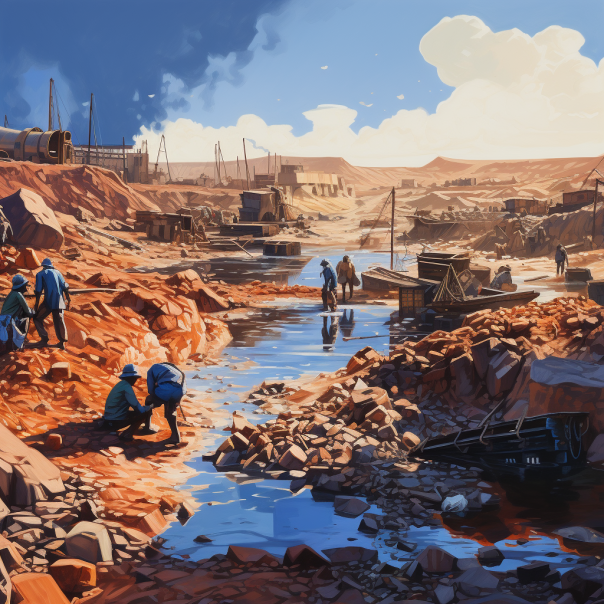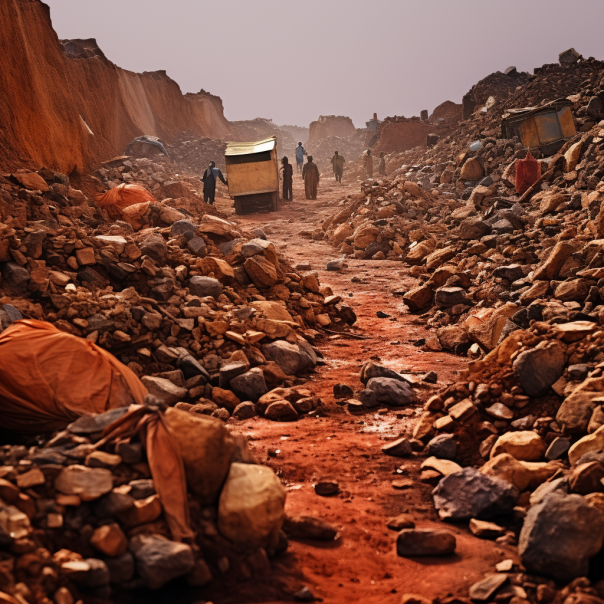The Cobalt Mining Conundrum
As modernity propels us forward, the high-stakes demand for elements crucial to technological development, such as cobalt, continues to soar. This trend is especially significant in the Democratic Republic of Congo (DRC), which hosts more than half of the world’s cobalt mining reserves. But, beneath the allure of this treasure trove, a dire reality lingers.
The Depths of Despair
In the cobalt-rich DRC, where people’s hopes are mired in hardship, there exists a stark dichotomy. While on one hand, cobalt mining is viewed as a potential pathway to prosperity, on the other, it becomes a conduit for unimaginable human crisis.
The impoverished workforce, known as artisanal miners, bear the brunt of this perilous industry. These workers, equipped with rudimentary tools, often risk their lives extracting cobalt from precarious trenches and tunnels. They then sell their dangerous yield into the mainstream supply chain, earning a meager income barely enough to survive.

Moreover, the ecosystem bears the scars of this industry. Mines have replaced lush forests, while air and water pollution levels rise, threatening both human and animal life. Furthermore, cobalt’s toxicity poses a constant health risk to those in direct contact with it, with the effects permeating even to the youngest members of the community.
The Indistinguishable Dual-Nature of Cobalt
Despite the attempts to separate artisanal mining from industrial operations, the reality is that these two sectors are intrinsically linked. Industrial mines, while appearing cleaner and more orderly, often have artisanal miners laboring on their peripheries. This cross-contamination blurs the line between the sources of cobalt, muddling any attempt at ethical sourcing.

Exploitation and Hopelessness
Miners’ day-to-day existence is characterized by squalor and despair, creating an environment that parallels historic slavery. Villages are uprooted to make room for mines, leaving people with no choice but to turn to mining for survival. Forced labor, child labor, and human trafficking cast a dark shadow over this industry, with the impoverished and the young bearing the harshest brunt of this reality.
Crumbling Safe Havens
Adding to the human toll, artisanal mines are incredibly unsafe. With a constant risk of collapse, these hazardous sites see countless accidents. Many are buried alive or suffer gruesome injuries, forever altering their lives and those of their loved ones.
The Corruption Enigma
Institutional corruption poses yet another hurdle in addressing these issues. An impoverished nation like the DRC, with a history of political instability and exploitation, often finds itself on the receiving end of the toxic side effects of global demand for its natural resources. Corruption ensures that the system remains broken, hindering meaningful change.
A Call for Change: Towards Ethical Cobalt Mining
While the picture painted above is indeed bleak, it’s important to remember that the solution doesn’t lie in rejecting cobalt outright. Rather, we should turn our attention towards improving the supply chain. This is essential because cobalt plays a pivotal role in technological advancements and the transition to sustainable energy sources.
We must ensure that the shift towards green energy and electric vehicles doesn’t come at the expense of human rights or environmental health. Thus, we must advocate for the ethical sourcing of cobalt. Simultaneously, efforts should be made to improve living and working conditions for miners, while ensuring the preservation and restoration of the environment.
In conclusion, as we continue to benefit from advancements powered by cobalt, it becomes our collective responsibility to turn our gaze towards the horrifying realities of its extraction. Only then can we hope to fuel our progress without exploiting the most vulnerable or harming the planet.

